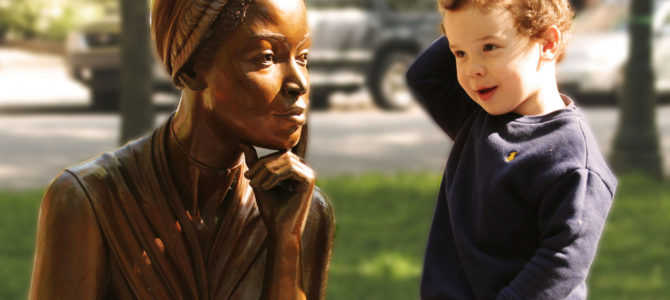
How many of us would imagine that an early American slave could have been among the world’s most-noted poets? Phillis Wheatley was. She earned the distinction of being the first African-American to publish a book, with the encouragement and assistance of her owners. She was also the sole African-American among the extremely small handful of published poets in the colonies, and the first black American writer to enjoy international acclaim. And she did all of this at a very early age.
Wheatley was born in 1753 in West Africa and, as a child, was sold into slavery by a local chief of her own people. The slave ship, The Phillis, delivered her as a product to Boston, where she was purchased by a prominent local tailor, John Wheatley.
The 9-year-old, cursed with the name of the vessel that had taken her from her home, worked as Wheatley’s wife’s servant and was tutored by their daughter. Soon, given her demonstrable talent, they allowed her to focus more on her studies than on household labor. She learned to read and write English in about six months and soon after that began to read the scriptures and classic literature in Latin and Greek.
It would have been difficult to find a white woman who was more educated than she, not to mention a male or female slave. Even most men were not that well-educated, then or now. Imagine a teenager today who reads the classics in Greek.
Wheatley’s national acclaim began when she was only 17, after just nine years on these shores. It started with her eulogy of one of the most significant influences in her life, the great evangelist George Whitefield, under the long but elegant title “An Elegiac Poem, On the Death of that Celebrated Divine, and Eminent Servant of Jesus Christ, the Late Reverend, and Pious George Whitefield.”
It was published widely in newspapers across the colonies including Boston, New York, and Philadelphia, and brought her immediate acclaim. She summed up Whitefield’s message and mission this way:
It was no less than GOD’s co-equal SON!
Take HIM, ye wretched for your only Good;
Take HIM ye starving souls to be your Food.
Ye thirsty, come to his Life-giving Stream:
Ye Preachers, take him for your joyful Theme:
Take HIM, “my dear Americans,” he said,
Be your complaints in his kind Bosom laid:
Take HIM ye Africans, he longs for you;
Impartial SAVIOUR, is his Title due;
If you will choose to walk in Grace’s road,
You shall be Sons, and Kings, and Priests to GOD.
One cannot miss the radicalness of her verse. She encourages her own people, valued then in this country almost exclusively as human tools, to embrace “GOD’s co-equal SON,” who would make them not only more free than they could ever imagine, but also totally equal to their enslavers as “Sons, and Kings, and Priests to God” who shows no impartiality. Could there have been a greater, bolder, and more eloquent voice for the God-endowed equality of all people in the colonies than this young lady? Phillis was as fearless as she was refined.
One short poem, “On Being Brought from Africa to America,” reveals her complexity, seeing her abduction to the colonies as a mercy because it brought her to faith in her dear savior. (Elsewhere, she spoke of her slavery as severely unjust and was involved in abolitionist work.) The whole poem is this (text from first edition of her book):
Twas mercy brought me from my Pagan land,
Taught my benighted soul to understand
That there’s a God, that there’s a Saviour too:
Once I redemption neither sought nor knew.
Some view our sable race with scornful eye,
“Their colour is a diabolic die.”
Remember, Christians, Negroes, black as Cain,
May be refin’d and join th’ angelic train.
Note the last four lines here. She again reminds her white captors, even those who are Christians and should know better, and that “Negros” will be redeemed without reserve and live alongside them free in heaven as equals. This is a bold clarion call for equality found in Christianity from a teenage female slave.
Her fame allowed her to travel to London and be honorably received by many dignitaries in the government and monarchy. Her work was known and valued by the likes of John Newton, George Washington, Thomas Paine, and Benjamin Franklin. Many of these welcomed meeting her.
Since most doubted a young slave girl could pen such sophisticated verse, she was required to prove her authorship in court, leading John Hancock and others to attest in the preface of her book, “Poems on Various Subjects” that she was indeed the author. Her owners emancipated her after the book was published in London in 1773.

Through many unfortunate turns and twists, Phillis died in December of 1784 at the age of 31, dreadfully destitute. Her husband was imprisoned as a debtor, leaving her to make do for herself and her sickly child. The best work she could find was as a lowly kitchen maid in a boarding house, work she was ironically unsuited for given that the Wheatleys had not even required it of her in slavery.
As one contemporary recorded, “She was reduced to a condition too loathsome to describe…The woman who had stood honored and respected in the presence of the wise and good…was numbering the last hours of life in a state of the most abject misery, surrounded by all the emblems of a squalid poverty!”
She died this way, but certainly did not remain so. Her deep faith and love of the savior ensures that she is indeed now wholly refin’d and a passenger in th’ angelic train.









